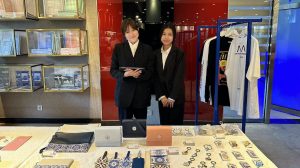A study involving a scholar from IFTM indicates families from Mainland China travelling to places on UNESCO’s World Heritage List expect their children to glean educational benefits from such trips. Tourism operators should take note, and develop products that address such expectations, the researchers say.
The study was co-authored by Dr. Fiona Yang, from the University of Macau, in partnership with IFTM’s Ms. Virginia Lau.
Chinese families consider “children’s experiential learning one of the most critical motives for family travel,” the authors wrote. The ‘World Heritage Site’ brand is “particularly appealing” to them in this regard. “Tourism operators should capitalise on such accreditation and tailor promotions to this lucrative market,” added the authors.
The comments – featured in the paper “Experiential learning for children at World Heritage Sites: The joint moderating effect of brand awareness and generation of Chinese family travelers” – were published in the June issue of the scholarly journal Tourism Management.
The primary objective of the study was to analyse the relationship between parents’ motivation to offer their children an educational experience on family travels, and their overall engagement with World Heritage Sites. The researchers also studied the influence of what they termed “on-site engagement by visitors” – with destinations – regarding possible educational benefits such UNESCO-listed sites offered for children.
The study results were based upon a survey answered by 557 respondents. The sample comprised tourists from Mainland China visiting major landmarks included in the Historic Centre of Macao, a UNESCO-listed World Heritage Site. Surveyed tourists had to be visiting the city as a “nuclear” Mainland Chinese family – i.e. 2 parents plus 1 child younger than 18.
The study examined parents’ general perceptions of the potential educational benefits that could accrue to their offspring via family travel. One of the findings was the “corroboration” of what the researchers termed positive “World Heritage Site brand effects” among travelling Chinese families that “crave nurturing their offspring”.
Such findings “confirm the importance of the World Heritage Site designation as a branding tool,” wrote Dr. Yang and Ms. Lau.
Promotion opportunity
The authors suggested several ways for destination managers of World Heritage Sites to tap into the burgeoning family-trip market of Mainland Chinese. They centred on tapping into such consumers’ interest in offering their offspring new educational opportunities.
World Heritage Sites should “allocate more resources in promotion campaigns targeting family travellers,” and ensure such locations have child-friendly facilities “augmented with technologies to create an immersive learning environment,” Dr. Yang and Ms. Lau wrote. World Heritage Sites could be “presented as avenues of learning for children” and their families via experiences that involve “interactivity with the environment, technology and parents”, said the authors.
The researchers stressed the importance of employing technology – including sound and light shows, augmented reality, QR codes and touchscreen devices – to create additional ways for visitors and their children to explore and interact with a particular site. This, they added, would also stimulate what they termed “spontaneous learning”.
Another suggestion included in the study was the introduction of “simple games, puzzles and quizzes for both parents and children” at World Heritage Sites to test such visitors’ knowledge of the place. These games should be tied to access to either souvenirs or certificates, as evidence of the experience the family has enjoyed at the site.
Chinese families are generally regarded as units that contain “high-achievers who possess positive attitudes toward exams and quizzes” and see such things as a way to measure the abilities of the adults and of their children, the researchers explained. Such families also “favour materialistic substance to make tangible their experience”.
The scholars cautioned that their study showed generational differences within Mainland Chinese families regarding the influence of the World Heritage Site brand on experiential learning during family trips. Such influence was not as strong among so-called ‘Generation Y’ parents – those born between 1980 and 1995 – compared to older Chinese parents.
Generation Yers “treasure more the experience” provided by the specific heritage site rather than the branding, the researchers stated. “For this segment of family travellers, site operators could develop hands-on programmes” to enable those people to explore the site independently “at their own pace without restrictions.”
“Thematic programme offerings such as movies, art, and music revolving around aspects of the World Heritage Site are particularly appealing to Generation Y family travellers and could pull them to the site for a unique experience,” concluded Dr. Yang and Ms. Lau.
More info
IFTM Lecturer Ms. Virginia Lau holds a master’s degree in business administration from Santa Clara University, California, in the United States. Her academic research interests focus on tourism and hospitality management, branding, corporate social responsibility, and tourism education. Ms. Lau’s work experience includes accounting-related positions in public and private entities, in respectively the United States, Hong Kong and Mainland China.
Fiona X. Yang and Virginia Meng-Chan Lau: “Experiential learning for children at World Heritage Sites: The joint moderating effect of brand awareness and generation of Chinese family travelers”, Tourism Management, Volume 72, pages 1-11, 2019.
https://doi.org/10.1016/j.tourman.2018.11.011









